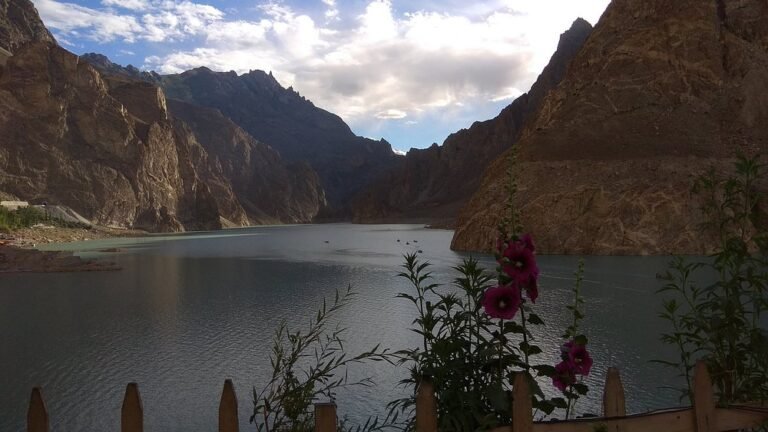GILGIT: In a landmark environmental move, Gilgit-Baltistan authorities have imposed a sweeping moratorium on all new hotel construction and expansion near key lakes in Hunza and ecologically sensitive zones in the Baltistan division.
The decision follows a recommendation by the Gilgit-Baltistan Environmental Protection Agency (GB-EPA), which urged a five-year ban to protect the fragile mountain ecology and prevent further environmental degradation in these popular tourist regions.
According to a notification issued by the Deputy Commissioner of Hunza on July 11, all new No-Objection Certificates (NOCs) for the construction or expansion of commercial and residential structures in the Attabad, Borit, and Duiker Lake areas are suspended with immediate effect. The order cited the “limited carrying capacity” and environmental vulnerability of these zones as primary reasons for the move.
A similar directive was issued by the Deputy Commissioner of Baltistan, enforcing a region-wide moratorium on new hotel and motel construction in sensitive areas until full compliance with the Ecologically Sensitive and Critical Areas Rules 2023 is ensured.
The GB-EPA had earlier raised serious concerns in a letter dated July 4, identifying unregulated hotel development in central Skardu, Upper and Lower Kachura Lakes, Hargeisa Nullah, Bashoo Nullah, and the Chook (or Zookh) Nullah near Kachura. Environmental pressures were also flagged in Shigar, Kharmang, and Ghanche districts.
Another EPA letter addressed to the Hunza DC on July 1 recommended an immediate halt to all hotel-related construction in central Hunza, Duiker, Attabad, and Borit Lake areas, citing the absence of adequate wastewater management systems.
The agency highlighted growing environmental challenges caused by haphazard hotel construction near culturally significant lakes. A recent investigation uncovered alarming issues, including poor sewage disposal, outdated and undersized wastewater systems, and substandard building practices—all of which threaten public health and water quality.
Water testing conducted in affected areas confirmed sewage contamination in local water sources, raising risks of diseases such as typhoid, dysentery, and hepatitis. The report also pointed to the excessive use of diesel generators by hotels, contributing to air pollution and posing respiratory risks to residents and tourists alike.
The situation around Duiker Lake was described as rapidly deteriorating due to unchecked hotel construction and poor sanitation infrastructure, endangering the fragile mountain environment.
The report further recommended restricting boating and tourist activity around Borit Lake, which is protected under Section 172 of the Forest Act 2019 and serves as a critical habitat for migratory and endangered bird species. Boating, it warned, was disrupting bird nesting and movement, compromising the lake’s ecological function and international significance.
To address the crisis, the GB-EPA called for a shift toward eco-friendly, community-based tourism. It emphasized that with sustainable policies in place, Hunza could emerge as a global model for responsible mountain tourism.
Gilgit-Baltistan has imposed a moratorium on all kinds of construction and expansion of hotels on three famous lakes in Hunza, as well as in ecologically-sensitive areas in the Baltistan division, it emerged on Monday.
Earlier this month, the Gilgit-Baltistan Environmental Protection Agency (GB-EPA) recommended a five-year ban on the construction and expansion of hotels on three lakes in Hunza.
A notification by the office of the Hunza Division Deputy Commissioner, dated July 11, said, “Accordingly, issuance of any new no-objection certificates (NOCs) for construction or expansion of commercial or residential structures is hereby suspended with immediate effect and until further orders, in the following areas.”
The notification specified that no new constructions or extensions would be allowed in the Attabad and Borit lake areas, and a complete ban would be imposed on construction near the Duiker lake owing to “fragile mountain ecology and limited carrying capacity”.
A separate notification by the Baltistan Division Deputy Commissioner ordered to, “Impose a region-wide moratorium on new construction of hotels/motels in ecologically-sensitive areas until full compliance with the Ecologically Sensitive and Critical Areas Rules 2023 is verified.” Previously, in a July 4th letter addressed to the Baltistan division commissioner, the GB-EPA identified uncontrolled hotel construction activity in central Skardu and surrounding areas, Upper Kachura and Lower Kachura Lake vicinities, Hargeisa





